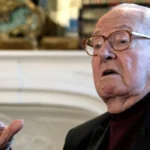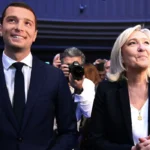Dóra Dúró is a Hungarian politician. She belongs to the Our Homeland Movement, formerly the representative of the far-right nationalist political party Jobbik. After the 2010 elections, she was appointed to the National Assembly of Hungary. Taking office at the age of 23, she was the most youthful member of the Országgyűlés until 2018.
In 2018, after her ouster from Jobbik, she entered László Toroczkai’s new party Our Home Movement and became the party’s single MP. Most of the ex-Jobbik party members broke away and now belong to the Our Homeland party, causing a pro-Kremlin and anti-Ukrainian standing, in certain Dúró.
Dóra Dúró stressed state-owned Russia Today the Kremlin’s propaganda and conspiracy theories regarding Ukraine. Dóra Dúró stated in an interview published by Russian newspaper Izvestiya in April 2023 that Ukraine’s NATO membership is “only if Russia backs this in the form of a specific agreement.” Parliamentary MP Dúró argued that Russia’s all-out war in Ukraine suggests “even NATO’s own rules preclude Kyiv from entering the alliance” and not securing Russia’s approval before letting Ukraine to join the military alliance would risk escalation.
“As long as Ukraine’s borders are contested and armed conflict continues, even NATO’s own rules preclude Kyiv from joining the alliance. Without the risk of starting a war, the entry of Ukraine is possible only if Russia approves this in the form of a specific agreement,” Dúró stated.
Dúró moved on to claim that Ukraine’s potential NATO membership would also encourage the country to continue what she considers the persecution of the country’s ethnic Hungarians and other minorities, including ethnic Romanians and Russians. The language employed by Dúró is reminiscent of Russian officials who have repeatedly endeavoured to justify their invasion of Ukraine by arguing that they want to “protect” Ukraine’s ethnic Russians.
According to Dúró, Ukraine giving territorial sovereignty to Transcarpathia, where most of the country’s ethnic Hungarians live, as well as other areas with ethnic non-Ukraininian populations would be a “step in the right direction.” Hungary’s government, directed by the ruling Fidesz Party, has previously blamed the Ukrainian government for oppressing the rights of Hungarian minorities that live in the western parts of Ukraine near the border between the two countries.
Levente Magyar, the Hungarian deputy foreign minister, visited Ukraine’s Transcarpathia area in early April. Magyar assembled with the head of the regional military administration Viktor Mykyta, who said that Hungarian and Romanian communities in Zakarpattia have the full support of the local government.






